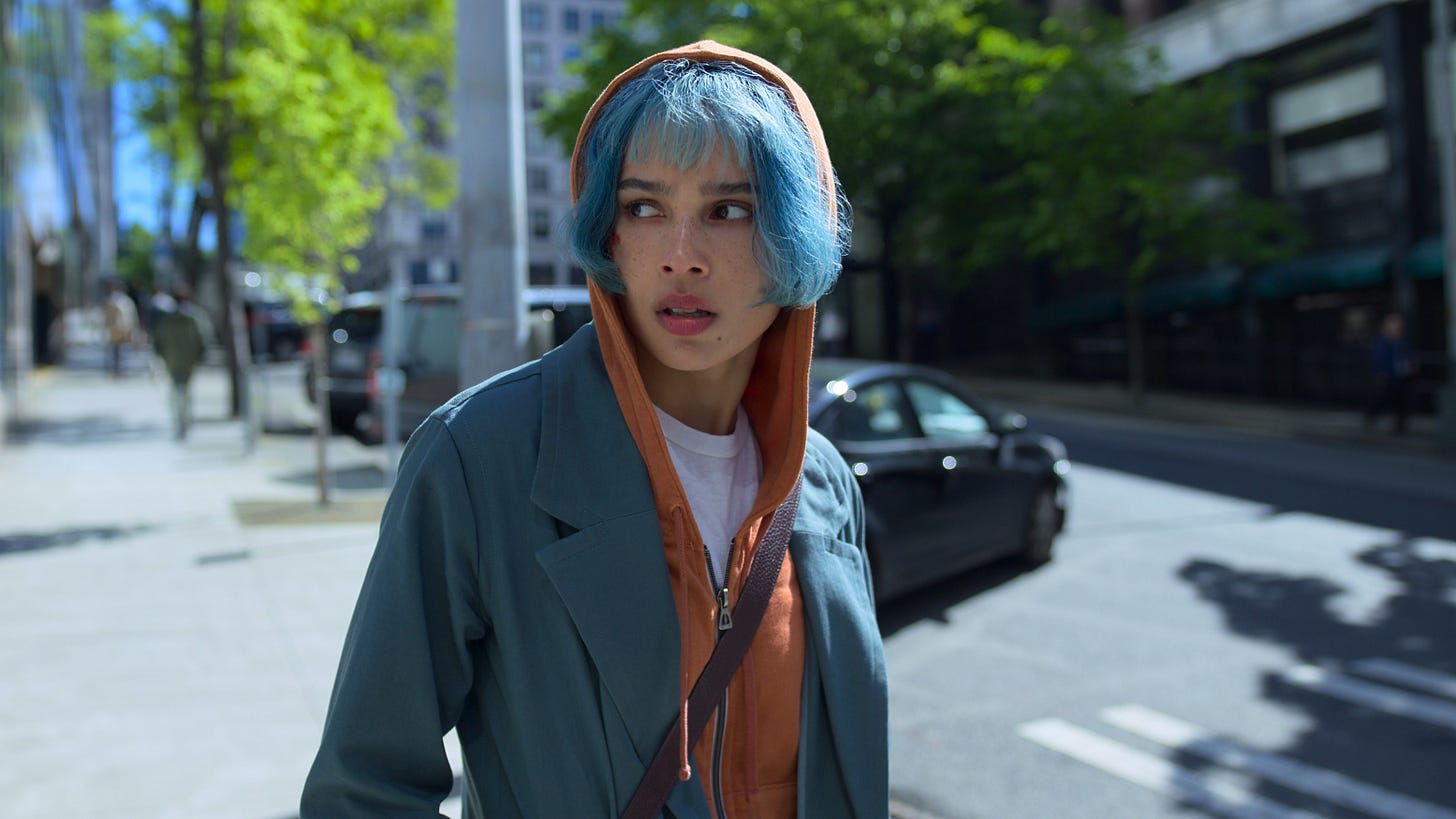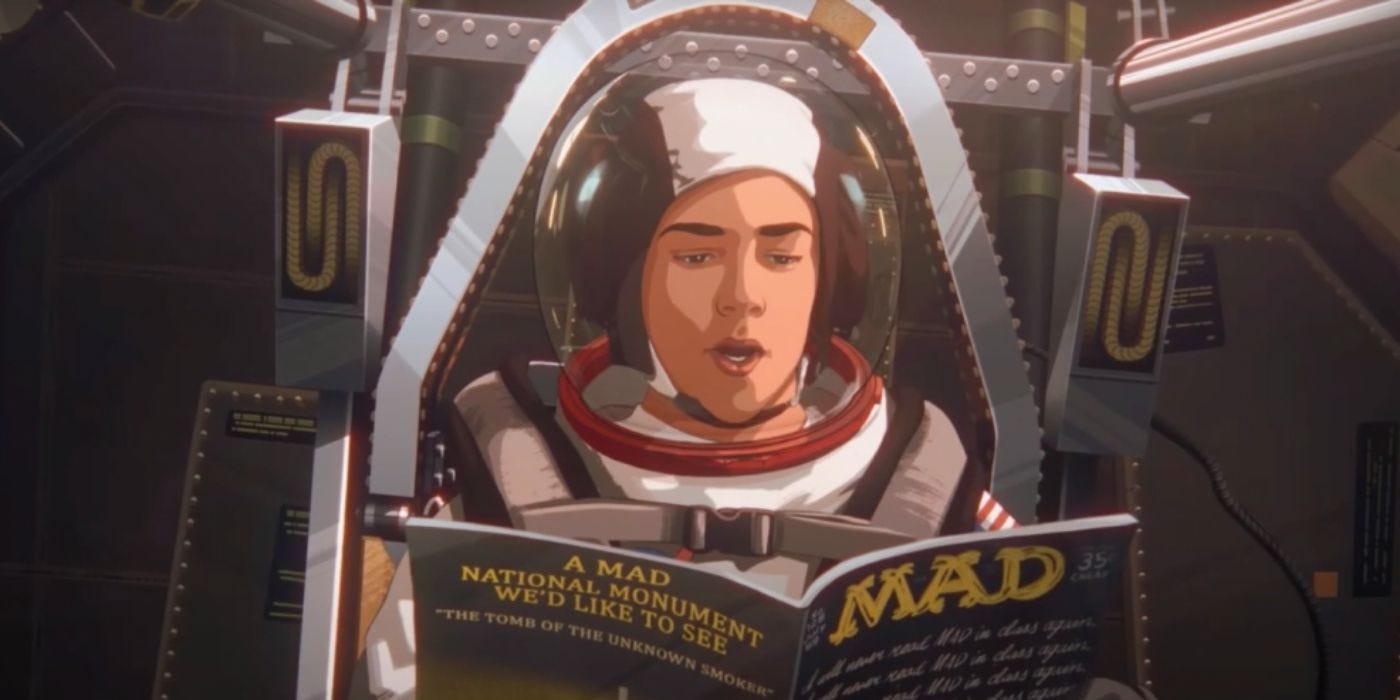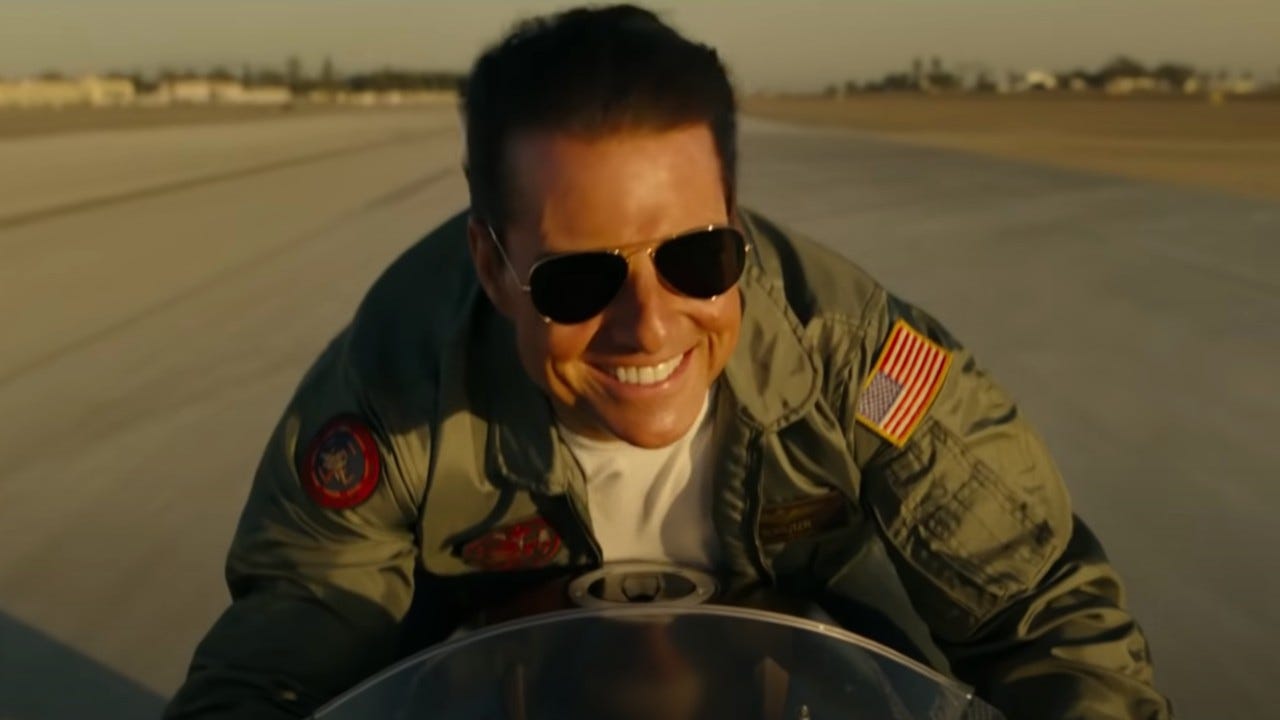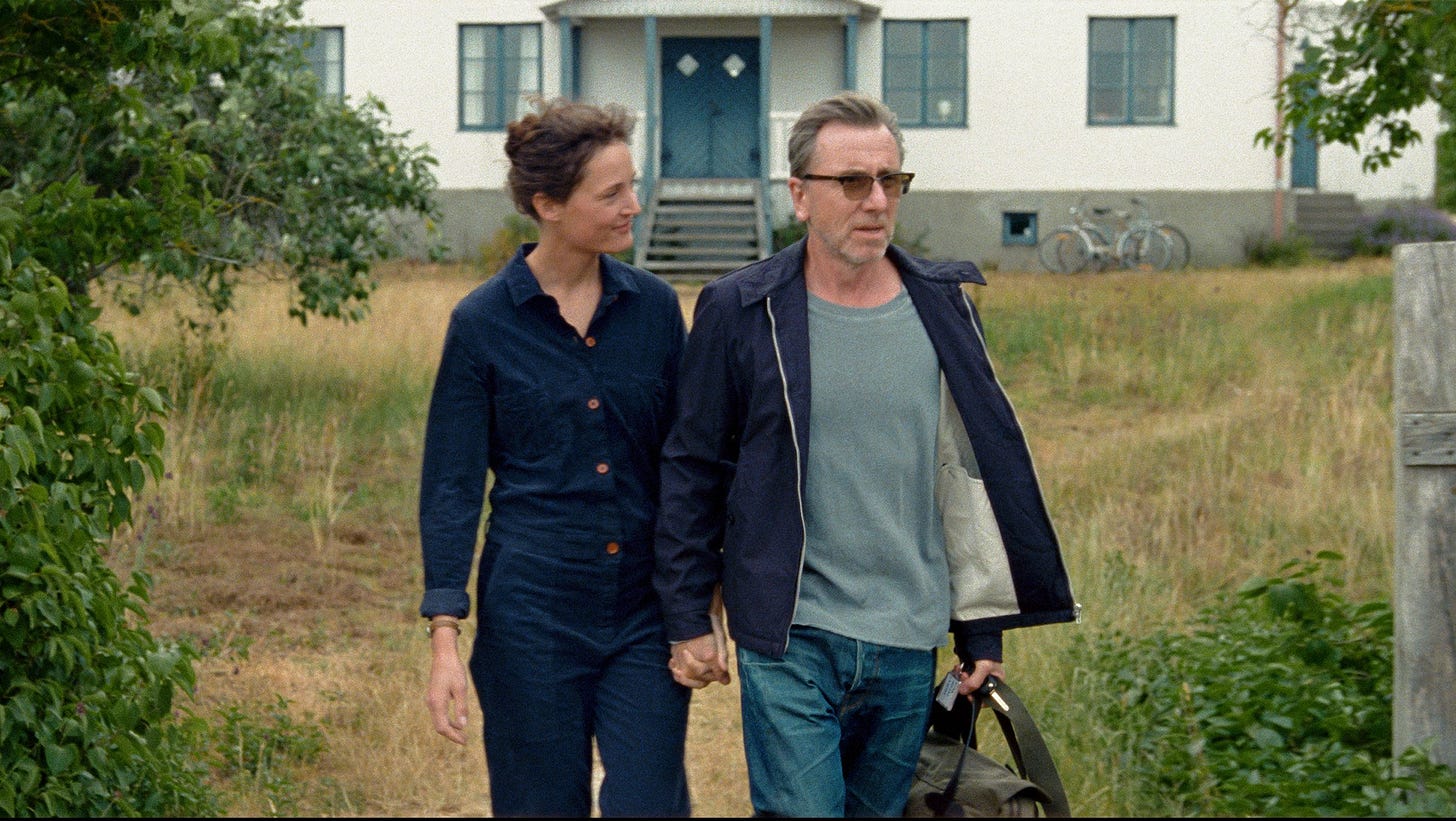It’s June! Halfway through the year! And I’ve seen a whole bunch of movies! (79, to be exact, although only about a quarter of them were movies released in 2022. If you want to see everything I watched, read, listened, and otherwise consumed this year, click here.) Which is to just say that instead of a review this week, I’ll be listing out my top 10 movies of the midyear.
Alex and I had originally planned on writing a couple reviews this week—I went out to watch the new Jurassic World: Dominion in preparation (in sum: it starts off fun in a kind of dumb way, but gets boring quick)—but a few things came about that made us decide not to take that oh-so-precious mental effort to actually sit down and come up with some coherent critical opinions. The two of us have recently been busy with dissertation work—already a sizeable load. Then, three days ago, I tested positive for COVID! That threw a wrench not only in daily activities—weakness and fatigue swing over me in waves—but also in a long-standing plan to go to Paris this week with my girlfriend. We had to push our plans back a few days, and luckily, we still get some time there. (Which also unfortunately means I also won’t be getting a review out for this coming Tuesday.)
It hasn’t been fun. But hey! I had my midyear list already prepared, and COVID won’t stop me from sharing it.
If I already reviewed the films listed below, I’ll attach links in the end of the run-downs. Some links will go to my profile at The Student, Edinburgh’s student newspaper (the longest running in the UK!), where I briefly wrote before starting Airplane Mode. I only have a few reviews there, but be sure to read through my catalogue if you’re interested.
10. KIMI (Dir. Steven Soderbergh)
A pandemic-set paranoia thriller directed by one of independent cinema’s head honchos, KIMI hits that cinematic hour-and-a-half sweet spot. Zoë Kravitz shines as Angela Childs, an agoraphobic computer programmer who works improving the “KIMI” program—a smart speaker device akin to Siri or Alexa—by controversially listening in on people’s voice activation commands. The plot quickly drops Angela into a madcap investigation of corporate crime that Soderbergh executes with excitement and precision, never lingering longer than is required to keep our attention. Plus, the movie is set in Seattle! And I’m from Seattle! And it actually looks like Seattle! Because it’s actually shot in Seattle!
9. Apollo 10 1/2: A Space Age Childhood (Dir. Richard Linklater)
Coming-of-age filmmaker extraordinaire Richard Linklater returns to his surreal rotoscoping animation techniques (previously employed in Waking Life and A Scanner Darkly) for Apollo 10 1/2, a dreamlike childhood memory. The film zips around the fourth-grade experiences of Stanley (voiced as a child by Milo Coy and as an adult by Jack Black) like a rollercoaster at AstroWorld, the space-themed amusement park near Stanley’s pleasant Houston suburb. Growing up near NASA in 1969, all Stanley can think about is the possibility of visiting that final frontier: outer space. When two NASA officials show up to tell Stanley he’s just the kid they need for a new space mission, everything changes. Or does it? Apollo 10 1/2 is more interested in Stanley’s suburban upbringing—a life filled with as much wonderment and excitement as man’s first steps on the moon.
8. Top Gun: Maverick (Dir. Joseph Kosinski)
Tom Cruise is back, baby! Filled with dives, swoops, and other jet-fueled macho moves, Top Gun: Maverick brings everything you never knew you needed from a Top Gun sequel. It’s no accident that this is the only franchise film on this list: no other sequel, prequel, or re-quel in this year’s nostalgia-obsessed cinema ecosystem reaches the heights of Maverick’s practical-effects jet-pieces, nor its gloriously cheesy banter, nor again that eternally perfect Tom Cruise smile. The film balances fun with patriotism, tension with romance, intelligence with self-aware nostalgia, all to brilliant effect. As sequels go, I couldn’t ask for more. (See my original review here.)
7. Bergman Island (Dir. Mia Hansen-Løve)
For filmmaking couple Tony (Tim Roth) and Chris (Vicky Krieps), a summer sojourn to the childhood island of famously depressed filmmaker Ingmar Bergman turns out more productive than you might expect. Mia Hansen-Løve’s meta-tale of marriage, storytelling, and fractured love is a perfectly pleasant experience, at least on the surface. Bergman Island opens its emotions in pieces—small details that stitch together a tapestry of a marriage as it is, rather than how we’d like it to be. Another film plays out alongside the main story: that of Chris’ screenplay, a romance novel-worthy tale of love and lust, with brilliant performances from Mia Wasikowska and Anders Danielsen Lie. (See my original review here.)
6. Happening (Dir. Audrey Diwan)
Audrey Diwan’s Happening—whose original French title, L’événement, can hopefully break confusion with the M. Night Shyamalan trash heap—comes at a tragically prescient moment. Following the recent Texas anti-abortion legislation, Happening offers a piercing vision of a society set against women’s agency. Anamaria Vartolomei delivers a stunning performance as Anne, a bright university student with steely determination. Her desire to pursue an independent life in France in the early 1960s is met with a societal silence so potent that she finds herself isolated and shunned, conveyed by an intimate camera that frames us entirely in her perspective. The abortion scenes themselves are visceral in their horror—audiences be warned. But Anne’s quiet, stupendous determination for an independent life brings haunting inspiration to our present. (See my original review here.)
5. Red Rocket (Dir. Sean Baker)
We’re never told what happend to ex-pornstar Mikey Saber (Simon Rex) when he returns to his hometown of Texas City with nothing but a bruised-up face and a torn-up tank top—but after spending five minuteswith his annoying, infantile charisma, you can probably guess. Sean Baker’s pleasantly putrid tale of a small-town American huckster takes place, not accidentally, amidst the 2016 presidential election, in which another charismatic salesman made false promises to a population of disenfrachised citizens, all while evading responsibility and blame-shifting with a self-preserving dexterity. Red Rocket eases you into the world of a despicable character as he deftly exploits everyone around him. An American pastoral for our disillusioned era, Red Rocket entertains and disturbs in equal measure.
4. Everything Everywhere All At Once (Dir. Daniel Kwan and Daniel Scheinert)
Ever wanted to see a universe where people have hot-dogs for fingers? Or one where a raccoon acts like Remi in Ratatouille? How about a universe where a pinky can be filled with the power of Kung-Fu? No? Well, directors Daniel Kwan and Daniel Scheinert give them to you anyway, with mind-busting creativity to spare. Everything Everywhere All At Once lives up to its title in maximalistic, riotous style, imbuing juvenility with philosophical profundity. It will take you on a crazed journey into the pit of nihilism, only to find liberation in acceptance of the absurd. It’s profound, stupid, funny, and everything else all at once. (See my original review here.)
3. Paris, 13th District (Dir. Jacques Audiard)
For a film about love in the digital age, a monochrome color palette might not seem like the most obvious choice. But in Paris, 13th District, Jacques Audiard’s interwoven anthology tale set in the Olympiades neighborhood of the City of Light, the physical world often seems less intimate than that presented on Skype and Tinder. Featuring honest, lived-in performances from Noémie Merlant, Lucie Zhang, and Makita Samba, Paris, 13th District takes the time to understand and empathize with digital love. (See my original review here.)
2. After Yang (Dir. Kogonada)
Equal parts science fiction oddity, mournful melodrama, and philosophical contemplation, Kogonada’s After Yang delivers meditative cinematic poetry of an astounding degree. The Yang of the film’s title is an android played by Justin H. Min, designed to take care of Mika (Malea Emma Tjandrawidjaja), the adopted daughter of Jake (Colin Farrell) and Kyra (Jodie Turner-Smith). When Yang breaks down, innumberable questions arise. Have Jake and Kyra shirked their parental duties onto Yang? Did Yang offer their daughter something that they couldn’t? Who, or perhaps what, actually is Yang? These kinds of existential consdierations are often left to cinema’s more intellectual spheres, yet Kogonada puts these questions in the hands of a family searching for itself. With beautifully intimate performances and Kogonada’s exquisite eye for the moving image, After Yang offers a singularly breathtaking experience.
1. The Worst Person in the World (Dir. Joachim Trier)
When the world is at your fingertips, where do you run towards? That’s the question that plagues Julie (Renate Reinsve), a twentysomething Norwegian who hops between occupations, relationships, and lifestyles with wild abandon. The Worst Person in the World zooms in a year of her life, telling its story in twelve chapters, two boyfriends, and at least three career paths. None of them fulfill Julie to the degree she is searching for—another path, another possiblity, is always just around the corner. Directed by Joachim Trier by himself and his co-writer Eskil Vogt, the film is heartbreaking and hilarious, personal and pulsating.
I must admit here that the film is far from perfect. Some chapters are better than others, and one standout case—a CGI-laden shroom trip—nearly falls flat. But the film’s imperfections reflect the imperfections of a storytelling intimacy that has stayed with me every day since my first screening. As a close friend of mine brilliantly put it, The Worst Person in the World presents not a tragedy of scarcity, but a tragedy of abundance. It is the story of an aimless life, one filled with too many options and not enough time. Over the course of its two hours, a seeming lack of focus coheres into a landscape portrait of an uncertain life—with beauty, joy, and empathy at every turn. (See my original review here.)
—James Fahey












L’événement est l’adaptation cinématographique du roman éponyme d’Annie Ernaux, une des écrivaines les plus en vue sur la scène littéraire française. Je recommande vivement la lecture de ce livre.
Va sortir, présenté au festival de Cannes en avant-première, Les années Super 8 où les images prises en Super 8 par l’époux d’Annie Ernaux dans les années 70 sont commentées en voix off par L’écrivaine. Que montrent les images, que taisent-elles? L’écriture, les commentaires deviennent un hors-champ fascinant .